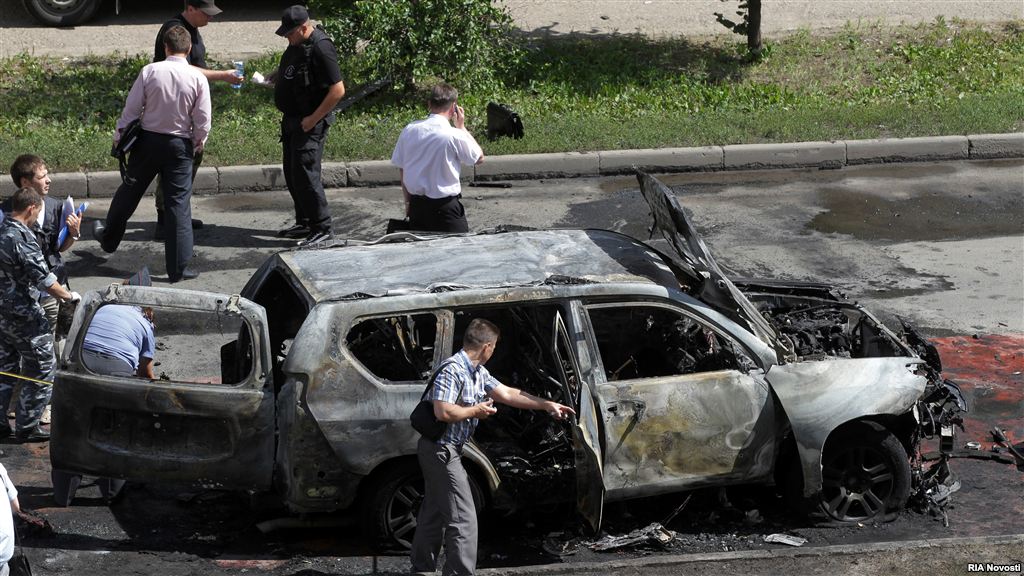
Is the Caucasus Emirate Encroaching on the Volga Region?
Publication: Eurasia Daily Monitor Volume: 10 Issue: 24
By:

On January 30, a conference on the influence of the Caucasus Emirate in the Volga region took place in Kazan (https://scienceport.ru/). Participants in the conference discussed issues related to the religious influence of the Northern Caucasus on the indigenous Muslim population of the Volga Region in the post-Soviet period. The migration of Islamic fundamentalist leaders and attempts by the Caucasus Emirate to expand the scope of operations of the armed jihadi groups to the Volga Region were considered the most important factors. Special attention was given to the popularity of some Islamic theologians from the North Caucasus among the youth of the Volga Region.
The fact that these questions were discussed exclusively by pro-Moscow specialists, known for their anti-Islamic and anti-Caucasian rhetoric, means that even this category of people in Russia have started to realize what has been obvious since 2005—namely, that the radicalization of youth and the spread of jihadist ideas is taking place throughout the territory of the Russian Federation, not only within the North Caucasus. The fact that the conference was held in Kazan was implicit confirmation that Tatarstan has become involved in the proliferation of jihadism. Attempts on the lives of Tatarstan’s mufti and his deputy that took place in the summer of 2012 (www.interfax.ru/russia/txt.asp?id=256389) were followed by police operations against Tatar militants in the autumn of 2012 (https://vserusskie.ru/news/134123).
In his speech, Farid Salman, the chairman of ulemas of the Russian Association of Islamic Accord, specified three stages of the radicalization of the Volga Region. The first stage was 1991–1999, the period after the disbandment of Soviet Union until the Second Chechen War. In this period, Tatar nationalists imagined Chechen militants as Muslims and fighters against the empire. The second period, 1999–2011, was associated with the head of the Spiritual Board of Muslims of Tatarstan, Mufti Gusman Iskhakov. During this period, contacts between Caucasian and Volga region Islamists intensified. The third period encompasses the last three years, 2011–2013, during which destructive processes in the Muslim community of the North Caucasus allegedly also became manifest in the Volga Region (https://crimerussia.ru/organizedcrime/58923-vliyanie-severo-kavkazskikh-vakhkhabitov-v-povolzhe-budet-usilivatsya-eksperty.html). All three stages of the process of radicalization of Volga Muslims, according to Salman, were directly connected to the consequences of the war in Chechnya in the Caucasus. It must be noted that this was the first time such admissions were made at such a high level inside Russia. Salman stated that the Salafis can only be defeated using force, and therefore there should not be any talks with or recognition of them.
The head of the Department of Caucasian Studies at the Russian Institute for Strategic Studies, Yana Amelina, said that “now we can certainly talk about a united Islamist front from the North Caucasus to the Volga region that has been formed during the past several years.” According to Amelina, who is actively promoted by the Russian authorities, this situation has been taking shape since 2007, when the Caucasus Emirate was established (www.apn.ru/publications/article28381.htm). The head of the Volga Center for Regional and Ethno-Religious Studies of the Russian Institute for Strategic Studies, Rais Suleimanov, agreed with Amelina’s viewpoint. Suleimanov stated that “coordination between the Salafis of the North Caucasus and the Salafis of the Volga Region started after the first emir of the Tatar mujahideen (Rais Mingaleev) publicly took an oath of allegiance to Doku Umarov” (www.newsru.com/religy/04feb2013/salman.html).
Jihadist ideology is also finding support among some ethnic Russians, especially young people who convert to Islam, seeing it as having the power to confront the authorities. This explains why in the last several years there have been so many Russian names among those identified as having been involved in the armed resistance movement in the North Caucasus. The most popular ideologue of jihadism in the North Caucasus was an ethnic Buryat from Russia—Alexander Tikhomirov, better known as Said Buryatsky. The spread of jihadism among ethnic Russians (particularly even among the Buryats in the Russian Far East) is a relatively understudied issue, but arguably a very interesting one in light of the future impact on the ethnic Russian regions of the Russian Federation.
The Chechen influence on developments in Tatarstan has been discussed before (www.gazeta.ru/comments/2012/08/16_x_4728197.shtml). However, the conference in Kazan was interesting for its policy recommendations. The participants called on the government to refrain from having any dialogue with the Salafis. These experts, who are close to the government, demanded that Salafism (aka Wahhabism) be wiped out as a teaching. These conclusions will have an impact on the North Caucasus. In Dagestan, a public dialogue with the Salafis is taking place as the government is trying to shift gears—to exchange armed confrontation for ideological confrontation by establishing a dialogue with the Association Ahl al-Sunna. The Kazan conference’s recommendations could signal that this process of dialogue might be shut down in Dagestan, which would be a great mistake on the part of the authorities.
As usual, the United States received its portion of scorn from the conference participants. The imam of northern Omsk oblast, Akhmat-Khazret Akhmetov, said: “the American State Department’s policies are no different from those of Hitler’s, but we have not yet been able to realize it properly” (https://dum26.mashuk.ru/stati/3830-politika-gitlera-ot-politiki-amerikanskogo-gosdepa-nichem-ne-otlichaetsya-tolko-my-nikak-ne-mozhem-etogo-ponyat). The official clerical establishment in Russia still speaks in the language of the Cold War. So, for the current Russian Muslim clergy, little has changed since the Soviet period.
The pro-Kremlin “specialist commissars” have been forced to admit that the situation in the Volga Region has deteriorated along the lines of the North Caucasus. In fact, having accepted that the Volga region’s Muslims— Tatars and Bashkirs in particular—have been radicalized as a result of the situation in the North Caucasus, the conference participants nevertheless refused to consider the impact of other Islamic forces, such as Turkic radical elements (www.archipelag.ru/authors/malashenko/?library=1749). Narrowing the problem to “everything is a consequence of the Chechen war,” the Kremlin’s experts simplify it and consequently misinterpret the events in the region as a whole. Tatarstan will certainly not become a region like the North Caucasus because of, among other things, the Tatar mentality. Most Tatars are secular and retain pro-Western points of view. Tatarstan will create problems for Russia not through armed actions but through its policy of extorting the central government, by blackmailing Moscow with a hypothetical union with the North Caucasians. This has been the general strategy of Tatar nationalists since 1991 and is unlikely to change in the near future.




